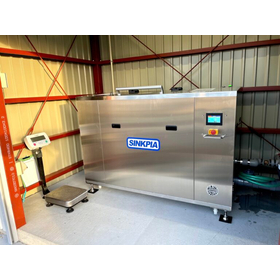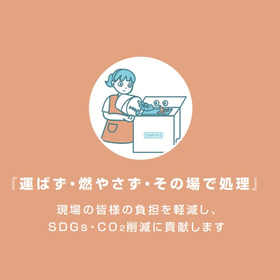[Installation Example] Toyokawa Village School Lunch Joint Cooking Facility
The concept is "no transportation, no burning, processing on-site." In principle, there is no need to remove residues from the equipment.
We would like to introduce a case where two units of the commercial organic waste processor "Sink Pia GJ-30" were installed at the Toyooka Village School Lunch Joint Cooking Facility in Nagano Prefecture. The organic waste generated from the kitchen is treated through biodegradation using microorganisms, so there is generally no need to remove residues from the equipment. Additionally, it has been installed in hundreds of locations, including restaurants, supermarkets, school lunch kitchens, food processing plants, and employee cafeterias, and the demand is significantly increasing. [Case Overview] ■ Installation Location: Toyooka Village School Lunch Joint Cooking Facility ■ Installed Product: Commercial Organic Waste Processor "Sink Pia GJ-30" *For more details, please download the PDF or feel free to contact us.
basic information
For more details, please download the PDF or feel free to contact us.
Price range
Delivery Time
Applications/Examples of results
For more details, please download the PDF or feel free to contact us.
catalog(4)
Download All CatalogsRecommended products
Distributors
"What we want you to discard is the conventional wisdom of food waste disposal machines." The development concept of Sink Pia is to process food waste 'without transporting, without burning, and on-site.' By self-processing food waste within facilities, it contributes to CO2 reduction and the SDGs. Japan's food waste disposal, which has relied heavily on incineration, is at a turning point, and many companies are entering the food waste processing machine industry to meet the needs of the times. However, it is also an industry where many companies have been forced to withdraw due to issues related to research and development costs, as well as a lack of knowledge, experience, and skills. Some have already started demonstration experiments, focusing on the development of microbial houses using biodegradable materials, the development of devices for processing dirty biodegradable containers, and further research on resource recovery such as liquid fertilizers and soil conditioners from decomposed water. We aim to be a company that is needed by more customers and can realize a society that is friendly to the future of the Earth's environment.



























































